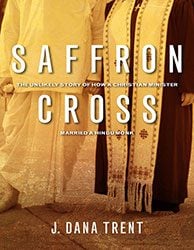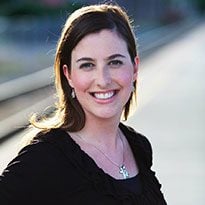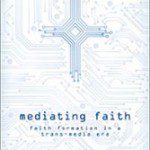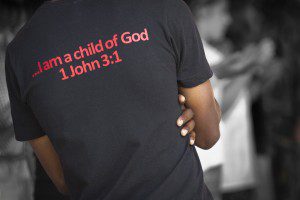 This month at the Book Club, we’re featuring a new book by Baptist minister J. Dana Trent called Saffron Cross: The Unlikely Story of How a Christian Minister Married a Hindu Monk. We invited the Rev. Trent to reflect on some questions about the gifts and challenges of her interfaith marriage for us here.
This month at the Book Club, we’re featuring a new book by Baptist minister J. Dana Trent called Saffron Cross: The Unlikely Story of How a Christian Minister Married a Hindu Monk. We invited the Rev. Trent to reflect on some questions about the gifts and challenges of her interfaith marriage for us here.
Tell us about the title of your book.
We wanted a simple title that reflected the seemingly contradictory nature of a Baptist minister marrying a Hindu monk. I was inspired by the rhythm of the Crosby, Stills, and Nash song “Southern Cross.” Saffron Cross, like “Southern Cross,” has three syllables, an auspicious number in both Christianity and Hinduism. We chose two terms that represented each faith—but also two words you weren’t likely to see juxtaposed. Saffron is the color of robes that Hindu monks wear, while the cross is an essential image of Christianity. Saffron Cross felt like a powerful visual of the two traditions coming together—like an Easter cross draped with a saffron cloth.
Where did you grow up, and what is your religious background?
 I was born in Arcadia, California, just outside of Los Angeles. My parents moved to my father’s hometown of Dana, Indiana (my namesake) when I was just three months old. When I was 6, they divorced, and my mother and I moved to Chapel Hill, North Carolina, where we attended The Olin T. Binkley Memorial Baptist Church regularly. I was baptized at Binkley when I was 11, just one month before we moved to my mother’s hometown of Reidsville, NC. There, I continued to be formed in the Baptist tradition by the loving congregation and pastoral leadership of First Baptist Church.
I was born in Arcadia, California, just outside of Los Angeles. My parents moved to my father’s hometown of Dana, Indiana (my namesake) when I was just three months old. When I was 6, they divorced, and my mother and I moved to Chapel Hill, North Carolina, where we attended The Olin T. Binkley Memorial Baptist Church regularly. I was baptized at Binkley when I was 11, just one month before we moved to my mother’s hometown of Reidsville, NC. There, I continued to be formed in the Baptist tradition by the loving congregation and pastoral leadership of First Baptist Church.
I’ve been a Baptist my entire life, with the majority of my affiliation tied to the Southern Baptist tradition. But I also attended a Moravian college and was influenced by the United Methodist Church and Episcopal traditions while attending and working at Duke Divinity School. I’ve been fortunate to be exposed to Christian ecumenism while keeping my solid Baptist roots.
When did you decide to become a Baptist minister?
I was very involved in parish life growing up at Binkley and First Baptist; church was the hub of our weekly schedule. During those years, adults who nurtured and formed me as a fledgling Christian saw budding spiritual gifts in me that I could not yet see. I only knew that I loved scripture and mystery, and usually only felt a sense of belonging only when I entered the doors of a sanctuary.
At college, I majored in French and history, and decided to become an attorney. Family, friends and the First Baptist congregation doubted this vocational choice and encouraged me to seek other opportunities. The summer before my junior year at Salem College, I visited Duke Divinity School at the persuasion of my mother and folks who knew (long before I did) that I was not suited for law school. The day I visited Duke, I had a Holy Spirit stirring that this might be my future path.
The First Baptist Church congregation was very supportive of my change in direction, and voted to ordain me to the gospel ministry of Jesus Christ the fall of my senior year at Salem College. It’s important to understand that, for Baptists, the ordination process is traditionally about recognizing someone’s spiritual gifts and setting them apart for ministry. It’s a much less formal process than what our other Protestant brothers and sisters have established.
I was ordained a Southern Baptist minister on November 17, 2002, when I was 21 (!). It was a huge leap of faith for the First Baptist Church community, and I am grateful for their faith in the spiritual gifts they saw.
Do you currently pastor a church?
No. I have always felt called to “extension” ministries: working as a chaplain and for nonprofit organizations. I enjoy teaching, preaching, and worship leadership, and I am fortunate to live in a community where I am afforded those kinds of service opportunities without holding a senior pastor role. I am involved in Binkley Baptist Church, where I am currently a member and have served in interim staff capacities in Christian formation, as well as on the diaconate.
What initially drew you to your husband, Fred?
Fred’s eHarmony profile hooked me immediately. His responses were passionate and sensitive. It was clear that this was a man who had spent a lot of time thinking about God and the world, and where he belonged among the two. That was refreshing.
Prior to meeting your husband, were you familiar with the Hindu religion?
I’d taken an Eastern Religious Traditions course at Salem College to fulfill the philosophy/religion requirement for my BA. It was taught by a thoughtful Mennonite professor who lectured barefoot, which fascinated me into an immediate buy-in. We read the Bhagavad Gita, and I remembered being intrigued by the seemingly servant role of Krishna (God) as a chariot driver and companion to Arjuna. Krishna’s accessibility reminded me of Jesus.
This course would prove to be providential, because the Bhagavad Gita is central to Fred’s tradition of Gaudiya Vaisnavaism. Had I not been exposed to it and felt a connection with Krishna, I may not have been as open to Fred’s path.
How did your family and friends react to your courtship and marriage? What about your church?
Fred’s Christian family expressed a relief and joy in his having interest in a Baptist minister. His paternal grandmother, whom we call “Granny,” is a straightforward Texan who told him, “If you don’t marry Dana, I’m gonna beat your …”
Only a few folks expressed concerns, and it was mostly from my side of the equation. Their initial worry was a misunderstanding that all Hindu sects are polytheistic and practice idolatry. Gaudiya Vaisnavaism (the sect of Hinduism that Fred practices) is actually monotheistic, and deity worship is not in any way idol worship. Once we clarified these points, the anxiety began to evaporate.
We’re fortunate to be a part of progressive faith communities (Binkley Baptist Church and Sri Caitanya Sanga) who lovingly accept both of us, and that is a boon to our interfaith life. If either of us or our faith communities had been fundamentalist, this marriage would not have worked.
Fred and I have taught “Hinduism 101” at Binkley’s church school course, “Interfaith Encounters.” We’ve also shared our faith journey with another course, “It’s Not Just One Way.” We’ve spoken with the youth group on the challenges and joys of being an interfaith couple.
Sri Caitanya Sanga has been very welcoming to me. I think they were surprised at my initial eagerness to accompany Fred to worship services, holy days, and festivals. I can imagine they anticipated that a Southern Baptist minister would not be open to sincerely exploring Gaudiya Vaisnavaism.
How would you respond to a Christian quoting the scripture, “Do not be unequally yoked” (2 Corinthians 6:14) as reason to discourage or disavow an interfaith marriage?
I can understand this perspective and the concerns Christians may have for interfaith marriage. That said, it’s difficult to imagine that Fred and I could be “unequally yoked,” as we have each been the fortunate recipient of spiritual growth and transformation as a direct result of our Christian-Hindu partnership.
While some Christians may declare that Fred is an “unbeliever,” I argue that Paul qualifies his definition of a believer as one whose observable behavior is evidence for the depth of his or her faith.
In an interfaith context, this same discernment process is essential. Regardless of the details of someone’s faith and practices, if their resultant behavior leads to hate instead of love, vice instead of virtue, then one might be deemed an “unbeliever” even though he/she professes belief in Christ or whomever else. Sincere belief in a faith path should result in love, growth, and transformation—because this is the nature of God.
In Erika B. Seamon’s recent work, Interfaith Marriage in America: The Transformation of Religion and Christianity, Seamon writes that Reformation leader Martin Luther actually helped foster greater acceptance for blended marriages:
“Pay no attention to the precepts of those fools who forbid it. You will find plenty of Christians – and indeed the greater part of them – who are worse in their secret unbelief than any Jew, heathen, Turk, or heretic.”
It seems that Paul and Luther are encouraging Christians to turn the mirror on themselves when it comes to unbelief. Observable behavior is, to a limited extent, evidence of our faith journeys. If one claims to be a “believer” but does not show love, mercy, kindness—all reflections of a deep relationship with Christ, what is the true nature of their belief?
In our case, Fred’s actions (intense scripture study and spiritual practices, monastic lifestyle, vegetarianism, minimalism, compassion, and love) were, for me, a direct reflection of his deep belief. Therefore, I am less likely to consider myself “unequally yoked,” to Fred, because I am, in fact, yoked with a strong believer.
How did you know it was time to write about your marital journey?
When it was clear that we would get married, friends and family were curious as to how we’d make a Christian-Hindu life of two ordained people work.
Then, when we returned from our Indian ashram (temple) honeymoon, we were interviewed by our local newspaper. The wider community’s interest indicated to us that this was a spiritual story that many readers had a connection to, whether it was because they had interfaith relationships, or because it was a story about finding common ground and overcoming differences. In the midst of many religious divisions in our world, we realized that the Saffron Cross story could be a testimony to God’s love, grace, and mercy.
When you write about your relationship with your husband, do you feel you might be setting yourself up for ridicule from those who may not agree with an interfaith marriage?
Absolutely. Memoir is a risky genre, because you are pulling back the curtain of your public and professional persona to reveal a more vulnerable, personal you. Anything could happen; anyone can react to your journey, as would be his or her right to. Because Saffron Cross is not an academic article or journalism, readers’ responses may feel like a direct hit to your personal journey.
But this vulnerability comes with a reward: when a reader connects with your story and sees some aspect of his or her life in it, this is the essence of our humanity. Connection is encouragement for all of us to share life.
What kind of support have you received from others?
Fred and I are fortunate to have the loving support of family, friends, and faith communities. Binkley Church and Sri Caitanya Sanga have been pillars of encouragement; Fred’s guru, Swami B.V. Tripurari, has helped us see what a gift we’ve been given. My writing mentors and friends from Duke Divinity School have been steadfast partners who’ve pushed and inspired me to share this most precious gift of interfaith living.
We cannot underestimate the blessing of support for this project. Without that, there would be no Saffron Cross.
Do you ever find it difficult to live in an interfaith household? What are some benefits you have gained from living in a Hindu/Christian household?
Yes! It’s been difficult establishing a Sabbath-keeping routine, adjusting to a strict vegetarian diet, and merging the seemingly opposite frameworks of eastern and western religions. The benefits have far outweighed the struggles, because I feel, for the first time in my Christian walk, that I am living an integrated life of faith and practices.
Have there been times when either of you was tempted to try to convert the other to your own religion?
Yes, I’m ashamed to say it—but yes. Fred’s conversion tactics were more subtle than mine, as his goal has always been to “convert” me into utilizing Gaudiya Vaisnava practices to strengthen my Christianity.
Mine were less honorable. In the book, I write about trying to baptize Fred shortly after we’d begun dating. I was frustrated that he’d participated in an altar call during middle school, but was never baptized. I was operating from a place of fear, anxious about his salvation. Obviously, I was not yet versed in interfaith dialogue and understanding. My getting over his not being baptized was a crucial turning point for us.
What about raising children?
There are many interfaith families who do a remarkable job raising interfaith children. Susan Katz Miller, author of On Being Both (Beacon Press, 2013), is a daughter of interfaith parents who is now raising interfaith children in the Jewish-Christian traditions. Fred and I admire parents who choose a difficult path of exposing children to and encouraging participation in multiple faith traditions. We can imagine that it requires a careful balance of empowering children while not overwhelming them.
We would choose the same method. Fred and I have no sense that children couldn’t benefit from sincere participation in both Christianity and Hinduism. The spiritual goal for children (and adults!) should be to develop a meaningful relationship God that reflects the way they move about the world.
What do you hope that others will receive from your book?
Our prayer is that readers will feel connected to Saffron Cross and be encouraged to participate in a larger movement and conversation about interfaith living. If they haven’t already, we hope readers will feel more open to exploring a friendship with their office colleague or neighbor or friend for whom God looks very different. We can all learn from one another’s experiences of God, and our prayer is that Saffron Cross will help facilitate those conversations.
Do you plan to write another book once Saffron Cross is launched?
I think I have at least two more books in me. But, as Annie Dillard writes, “I do not so much write a book as sit up with it, as a dying friend. I hold its hand and hope it will get better.” This is to say that writing is difficult—but also transformational. Writing a book is a glimpse of the sacred this side of heaven. We read and write because we long for connection, and I have not found any other process by which I learn so much about myself and others.
Visit the Patheos Book Club to read an excerpt from Saffron Cross here.













